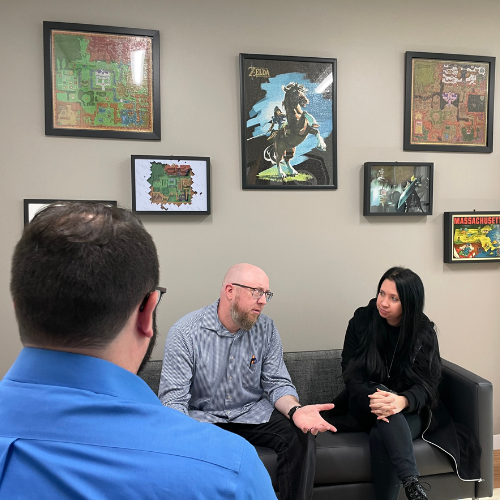Who is ANthony Bean?
Dr. Bean is a seasoned psychologist known for his diverse expertise and innovative approach to mental health. With a wealth of experience, he specializes in areas such as video game addiction, psychological assessments, and therapeutic interventions. Dr. Bean is a sought-after expert in media, frequently contributing insights on psychological topics.
His research spans contemporary issues, contributing valuable insights to both academic and practical domains. Known for a dynamic and engaging presence, Dr. Bean is dedicated to fostering well-being through a holistic understanding of mental health, making him a trusted figure in the field.
Video Game addiction and Geek Therapy expert
Court Ordered Psychological Services
License to Carry (LTC) Exam.
Fitness for Duty Exam; Lvl 3 & 4 security clearance
Medical Clearance for Surgery Assessment
Forensic Psychology; Expert Witness
Service Specialties
Dr. Bean’s extensive expertise extends to incorporating Jungian Therapy and Archetypal Therapy into his practice. Working with individuals of all ages, he addresses diverse challenges related to life circumstances. His approach emphasizes recognizing strengths, normalizing experiences, and utilizing therapeutic modalities like Jungian and Archetypal Therapy with other modalities like Geek Therapy. This innovative blend encourages individuals to rediscover internal strengths, fostering personal growth and fulfillment throughout the lifespan.

Consultation with Dr. Bean
Explore a personalized journey of consultation with Dr. Bean, where expertise meets individual needs. During your session, Dr. Bean combines a wealth of experience with a tailored approach, addressing diverse areas such as Psychological Assessment, Video Game Therapy, and Legal Clearances. Explore therapeutic modalities like Geek Therapy, Jungian Therapy, and Archetypal Therapy, uniquely adapted to your requirements. Dr. Bean’s consultations extend beyond conventional boundaries, offering insights into fields like surgery clearance, therapeutic game mastering, and expert testimony. Expect engaging discussions, practical guidance, and a collaborative exploration of solutions that resonate with your specific goals and concerns. Below are Dr. Beans most requested consultation topics however, topics are not limited to these and all consultation requests are tailored to client requests.
Psychological Assessments in three parts: Clinical Interview, Testing, and Findings
Clinical psychological assessments play a pivotal role in understanding and addressing various aspects of mental health. These assessments encompass a broad range of tools and methodologies designed to evaluate cognitive, emotional, and behavioral functioning. From standardized tests measuring intelligence, memory, and attention to personality assessments illuminating individual traits and dynamics, these evaluations offer valuable insights. Additionally, mental health assessments explore further assessment into mood disorders, anxiety, trauma, and other psychological conditions, providing clinicians with a comprehensive understanding of an individual’s mental well-being. Through a careful and nuanced examination, these assessments contribute to the development of tailored interventions and treatment plans, fostering a holistic approach to mental health care.
If you need an MMPI for your Security License please visit HERE.
Media Appearances with Dr. Bean
Dr. Bean has become a sought-after expert in the media, regularly contributing his insights on various psychological topics. With a dynamic and engaging presence, he has been featured on numerous platforms, including podcasts, TV shows, and radio programs. Whether discussing video game addiction, mental health, or therapeutic interventions, Dr. Bean’s media appearances are characterized by his ability to distill complex concepts into accessible and relatable insights. His articulate and personable approach makes him a trusted source for understanding psychological issues in the modern world, resonating with audiences seeking expert perspectives in an easily digestible format.
Most up to date research with dr. bean
Evidence-based Publications
Dr. Bean’s research endeavors reflect a commitment to advancing the understanding of complex psychological phenomena. With a focus on contemporary issues, his work spans diverse areas such as video game addiction, therapeutic interventions, and the intersection of technology and mental health. Dr. Bean employs rigorous methodologies, incorporating both quantitative and qualitative approaches to gather nuanced insights. His research contributions not only expand the academic discourse but also have practical implications for individuals and professionals alike. Through a dedication to evidence-based exploration, Dr. Bean’s research endeavors contribute significantly to the evolving landscape of psychology, shedding light on crucial aspects of modern-day challenges and therapeutic solutions.
Geek Centric books that examine the psychological impacts of geekdom and those who engage with it.
Checkpoints and Autosaves breaks down the best geek entertainment available for child development.
A comprehensive compendium of how Geek Therapy clinicians and scholars currently use a variety of games, media artifacts, and other geek culture items in therapeutic context and intervention.
Working with Video Gamers and Games in Therapy moves beyond stereotypes about video game addiction and violence to consider the role that games play in psychological experiences and mental health

